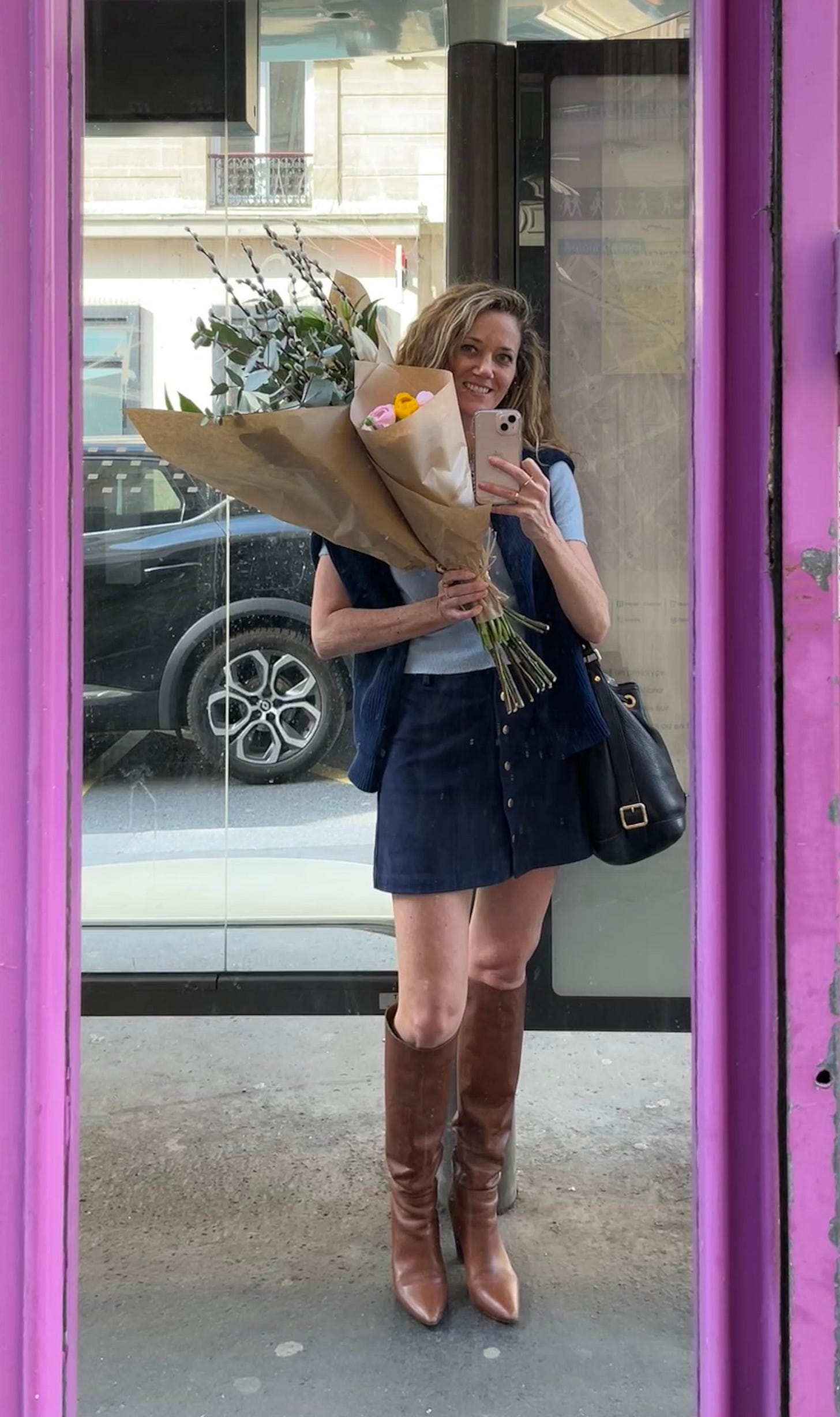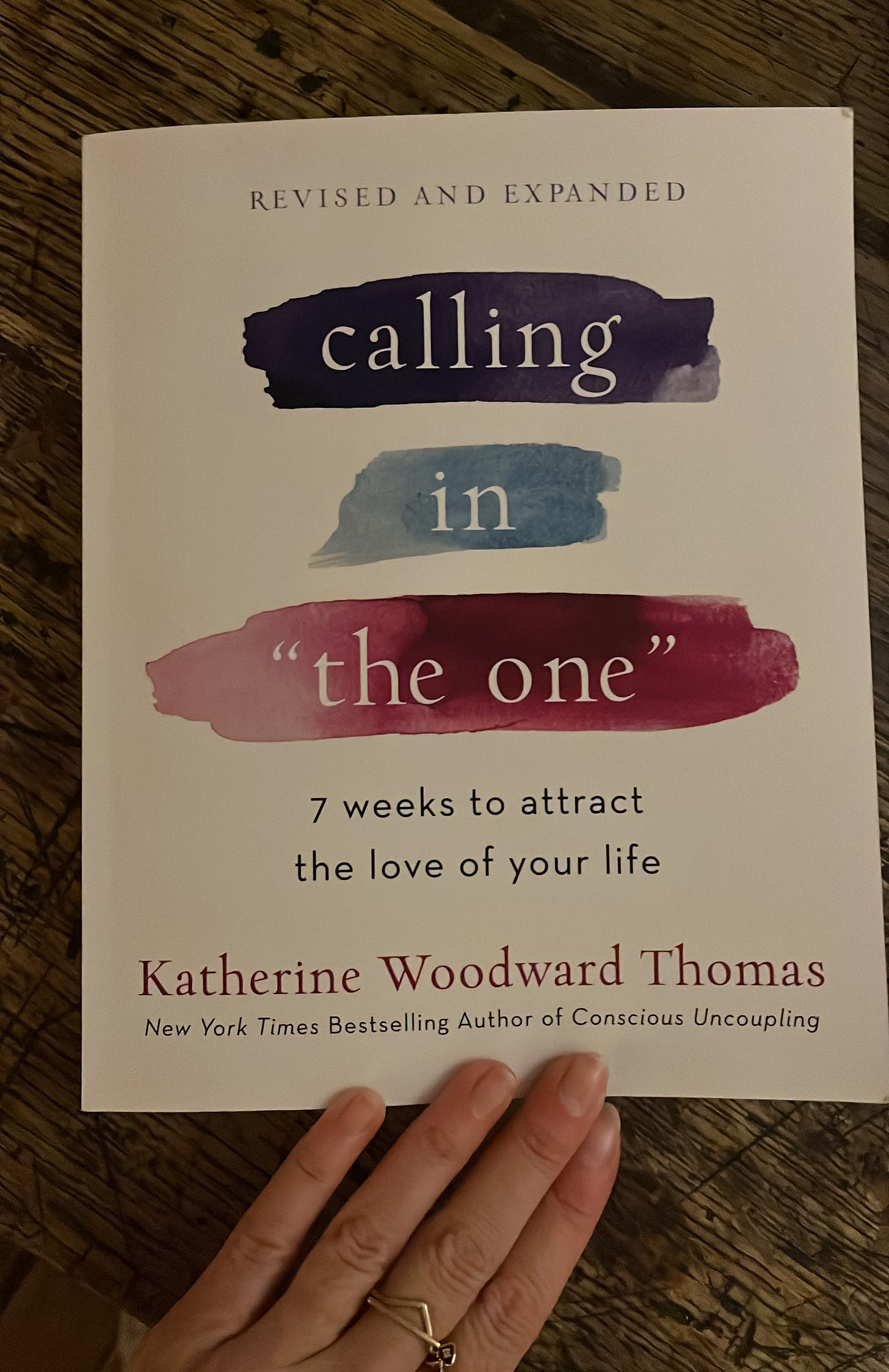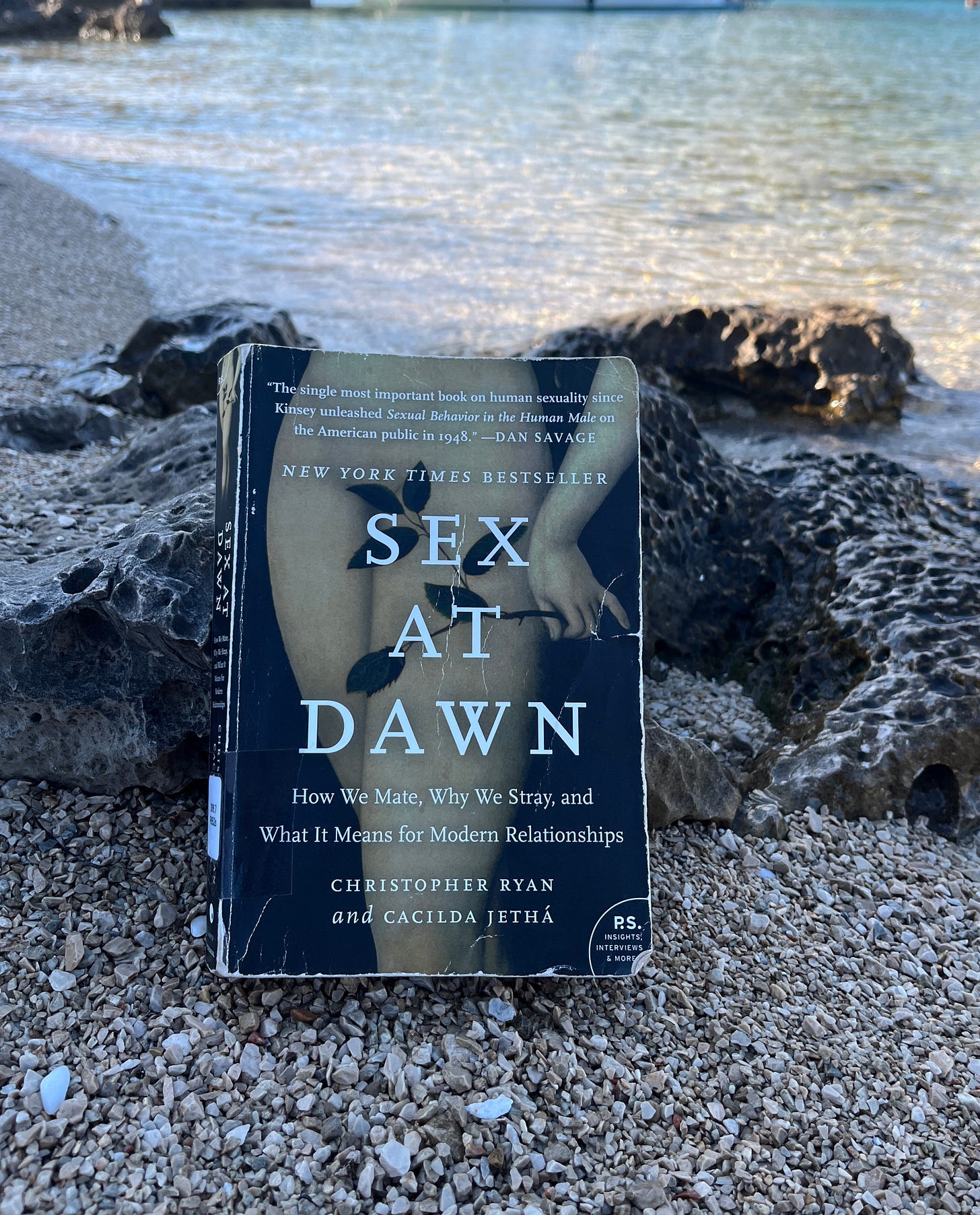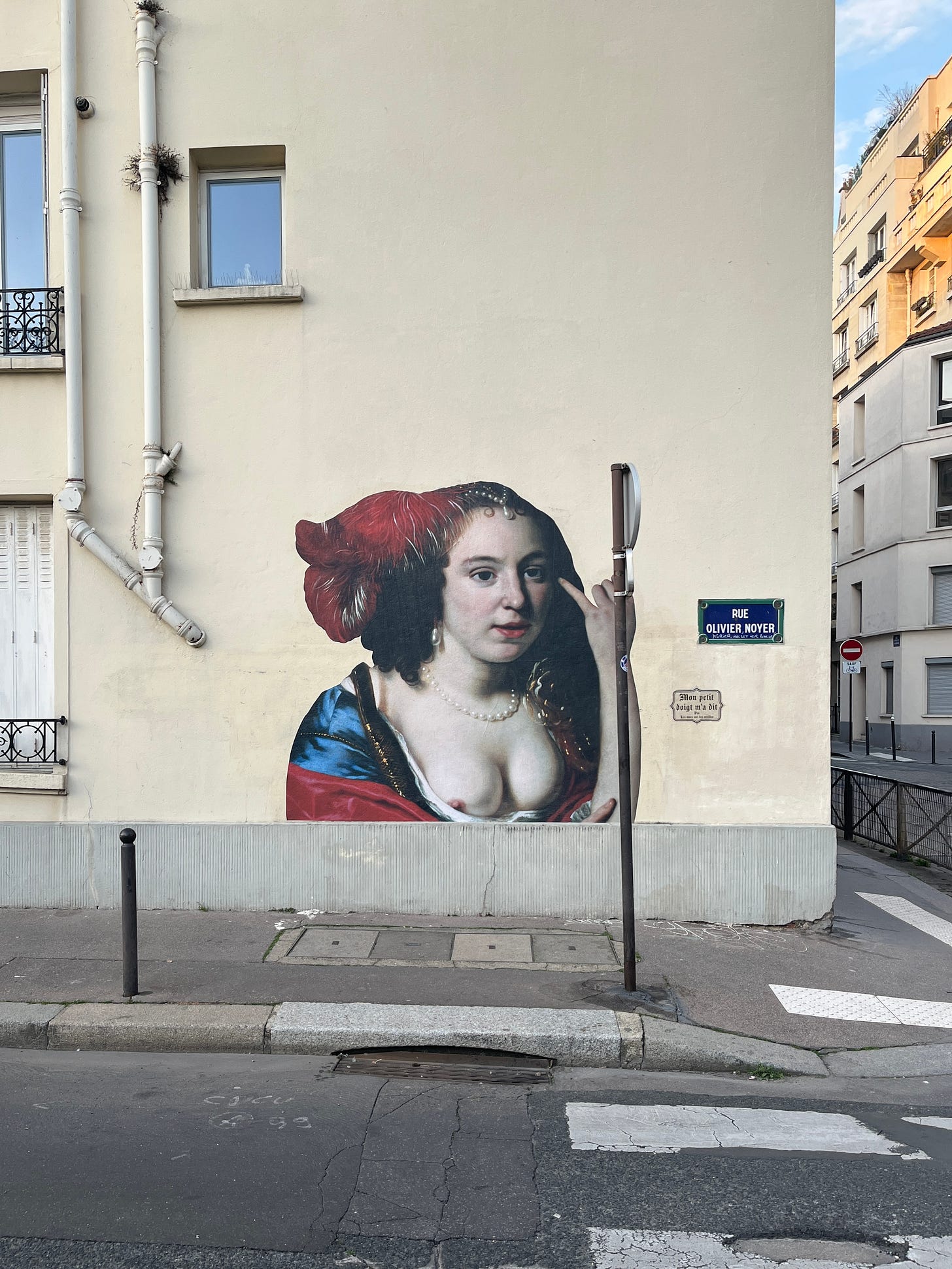I Tried "Calling in The One" and Failed. Or Did I?!
On embracing the "ordeal of freedom" (i.e. dating over 40). Also: a sex club.
Between the ages of 40 and 41, I somehow gave up wanting the lives other women have. Because I like my own(!). All the mess, chaos, and complaints of it. All the travel, freedom, love and its failure or success, desire satiated or not.
Thus far in 2025, 4 things happened that I think are responsible for this change:
1. I read Calling in the One: 7 Weeks to Attract the Love of Your Life.
And then proceeded to have one of the more *liberated* periods of my life. It’s like my soul revolted. But gosh I wanted to believe in that book. It was winter when I began, February. I did all the exercises, meditations, journal prompts, assignments. Wrote things out and burned the paper. Stuck affirmations on my walls. Told men from my past that I could no longer talk to them because I was freeing myself up emotionally for a boyfriend (sorry to those men). Told every man I went out with that was looking for a relationship. Went slow (a month of dating, no sex). Went too fast (sex on the first date). Turned down the invitation of one very nice man to go visit his apartment at the Cité radieuse in Marseille because my gut said he wasn’t “The One” and I was trying not to “travel date” anymore. At a Galentine’s Day dinner at Paris’ Hotel Amour on February 14th, I told a table full of single women about the book and how I was sure it would work, like it had for my beautiful (and also over-40) friend Jacqueline, who matched on an app with her Italian love-of-her-life one week(!!) into reading the book. (I think they’re on year two of their love story; she’s since moved from Paris to Italy. Who among us doesn’t dream of such a love?!)
Then it was April. And, well, you know what happens in the spring.
Big surprise: I did not call in “The One.” But the author’s argument isn’t really that, in the end. Rather, her argument is that you are your own “One.” If you honor your dreams, passions, pleasure, etc., you’re more likely to attract a partner who is living on the same energetic planet and pursuing similar goals as you, whether that’s marriage, family, career success, adventure, etc.
2. I read Marguerite Duras’ essay collection, Green Eyes: Essays on Film.
I took the book to a friend’s house in the countryside, where, in the middle of a green paradise, I was practically knocked sideways by the most incredible essay of hers, called “Solitude”:
“Most people marry to get out of solitude. To live with, eat with, go to the movies with. Solitude is blurred but not defeated. […] A lovers’ couple is short-lived. It never survives marriage. […T]he illusion remains intact, with every buddying couple, that it will be the exception to the rule. […] One cannot do anything from within the couple but to wait for that wonder, the days of love, to run out. The couple, for itself, is an end in itself. You don’t make anything as a pair, nothing, not even a child, it is made alone, not even love, it made somewhere else when it strikes; here, in the couple, you don’t experience it anymore; you while away the time, a lifetime. You pass over life. Life skimmed over isn’t wounding. Solitude is bearable that way; it’s no longer isolation. It’s on this score that the couple is enviable and that it seems like a brilliant formula for the passage of a lifetime in every society in the world. One is in a constant reference to a faithfulness that is framed as religious taboo. Our love was so strong that we cannot be unfaithful to it without blaspheming against God. […] If I am loving “somewhere else,” I am betraying the love of he or she who is waiting for me. […] Responsibilities nail one to the ground. Happiness doesn’t work. Doesn’t work with freedom. The ordeal of freedom is probably the hardest of all but it concerns another and terrible happiness.”
Never before had I seen it phrased like that (much less in a book published in 1980). “The ordeal of freedom”! “Another and terrible happiness”! I’ve spent the last two decades feeling lesser-than because I’m single (with the exception of 4 “real” relationships, none longer than 3 years). Lesser-than because I haven’t married. It’s important to note that I never felt judged because I haven’t had kids—enough women are child-free that our society no longer harshly judges such women, and we’re all PC enough to know now that sometimes this is out of a woman’s control, whether for fertility reasons or life reasons. No one really asks or shames women on this front anymore, at least in my experience. It’s more women questioning their choices or regretting not having kids at a younger age, when it was still possible. Also important to note that my parents have never shamed me or my sister for not marrying or having kids.
But why should two sisters make the same life choices? Isn’t it odd?
An astrologist once told me my mother “did not want her daughters to suffer as she has suffered.” And I don’t mean that to imply that my mother suffered in her marriage; she didn’t! Certainly there’s plenty to gain in any marriage. But there is also a subtle suffering inherent in monogamous marriage, for both partners but perhaps more for women: a loss of certain choices, like where to live; the loss of autonomy, replaced with compromise; the (often short-lived) loss of self that comes with putting one’s love for family and children ahead of one’s own self (or so I’ve heard).
Pressure to become a wife and mother? It didn’t exist in my childhood! I don’t think our mom ever talked about these things with us. My sister and I were babysitters, cheerleaders, dancers, performers, pet-sitters, good students, responsible good girls. But subconsciously, I think our mom wanted us to do what she didn’t get to do: travel, live somewhere we love, pursue our dreams, build successful careers, get college degrees (her biggest regret in life is not having one, but she had a corporate career even without it).
My sister and I, both in ours 40s, have master’s degrees, careers we like, freedom—but not partners, not children. And that’s okay.
3. I copyedited a friend’s memoir about his open marriage.
He’s a businessman in L.A. and Hawaii who’d been married once, without kids, when he met his current wife, who was also freshly divorced and had a son. Both in their early 40s when they met, they agreed to be open. Just that. Open. No rules, no monogamy. They’re partners in life, in their business, in love—and admittedly one of the only couples I know who have managed a successful open relationship, in part because they seem cut from the same cloth (i.e. not jealous or possessive, instead complicit in each other’s happiness).
In his book (which is not yet out), he mentions Sex at Dawn: How We Mate, Why We Stray, and What It Means for Modern Relationships. Guess what I immediately picked up at the American Library of Paris? It’s my reading material here in Croatia—will report back!
In short, this friend’s memoir is, well, it’s really good! What a fun life! What an adventure! What a joy to read about a loving relationship that’s actually still happy and “successful” (by which I mean ongoing).
But why are we so hard-wired for romance, for “forever” (which we all know by now hardly ever happens)? Why do we want relationships to be “going somewhere” and for that “somewhere” to be “until death”? Why are smaller trysts or short, interstitial romances seen as less valuable? Even if I’m freed from wanting what other women have (husband, house, family, cars, and now I’m laughing because I do want some of that, still), and even if I’m going full hedonist (given that, between the impending AI takeover and global wars, we’re pretty much doomed), why do I still want the semblance of long-term romantic possibility, an excitement about “what this might turn out to be”?
It seems to me that these expectations are psychological and societal, rooted in Disney movies, rom-coms, and shame around the word “slut.”
What if we let go of that expectation? What if we let go of shame? I’m working on it. Again, will report back.
Let me give you an example that is not myself, but a friend. She’s head-over-heels in love with her boyfriend of a few years. He’s about 7 years younger than her. They’ve prioritized their desire and have a fun, vibrant sex life. But since he’s younger, she knows that at any point in his late 30s or 40s or heck even 50s, he could decide he wants to marry and start a family—not with her, I mean. She’s in her early 40s, so the window is quickly closing. Most of the time, she understands that she’s sacrificing a status-quo type of relationship, one that’s “GOING SOMEWHERE,” for the pleasure of being in love, of long-lasting desire, a feeling they’ve managed to sustain for about 3 years in part because they’re *not* a traditional couple who cohabitate or see each other on a regular schedule. Chaos, unpredictability, uncertainty —> desire remains intact. (Of course, Esther Perel has already said this.)
Still, she sometimes freaks out because, well, where is this going?! Will she be hurt? Dumped? Will this end?
The answer is yes.
You want to marry? So happy for you! You want to raise kids with this person? Oh gosh, it’s going to be tough and I’m impressed with anyone who manages to stay together during those early years. You manage to stay married for 2 or 3 decades, or forever? Wow, what a feat!
But chances are, to paraphrase Marguerite Duras, your love is not going to survive marriage. And that is also okay.
These days, I think the question is not *if* you get divorced but, when you do, CAN YOU STAY FRIENDS? How *well* can you divorce?
Talking about this whole conundrum of romantic love and marriage with another friend of mine, a divorced Swiss-Croatian dad—who is now decidedly anti-marriage—said his buddy put it this way: “I didn’t succeed in my marriage. But I did succeed in my divorce.” <— And that, friends, an amicable divorce or de-coupling, is really the best we can hope for. Not “forever,” but friends.
* * *
A Brief Interlude on Feminism
I am a feminist and I talk about feminism a lot. Yet I think plenty of people might ask, Where is your feminism? Because it’s confusing! I like men—a lot. I prioritize men in my life, when the discourse says to “de-center” men. I like sex. I like when men pay on dates (I could write a Substack on that alone). I want to think I have a liberated sexuality but I know that’s hard to know and to do—rather, it’s a lifelong process of extracting yourself from the status quo and from expectations that you have about yourself and others. I think I do, I have, I am embracing, now, my fate. My identity. It’s who I am, and yet it’s also not fixed. Identity can change. What we want can change.
I used to ask, sort of jokingly, what was wrong with my mom and dad to have raised two daughters who haven’t married or had kids. But actually, now I think it’s their wisdom. Their great gift to us. Because we are two women who are feminist because we fully own our sexuality, we follow our curiosity, there is no man who controls our fate, choices, bodies. That’s feminism, baby. We also have erotic pleasure and experiences that others don’t get to have. That’s also feminism. For me, feminism is often about self-expression, a blunt refusal of shame.
The older I get, the more I think sex is about play. About freedom. If I can’t be totally myself, totally honest and silly, free to ask for what I want in the bedroom, I can’t be honest, silly, playful, asking for what I want, dreaming big and fantasizing and seeking pleasure and wanting autonomy in real life. They go hand in hand. It’s a life-long process, this movement toward openness. This refusal to judge: especially not one’s self.
While some women’s journey is toward identities like mother and wife, toward partnership, my journey has always been toward more freedom. And specifically freedom from societal expectations. (Including what a feminist is supposed to look, think, or act like.)
As the world becomes increasingly right-wing and the Christian Right assumes even more power in the U.S., now is the time for a feminism that looks like bold women’s voices prioritizing pleasure, prioritizing self-knowledge and agency. Not subservience to shame. Not Ballerina Farm—unless you choose that! Nothing wrong if you’ve chosen it!
It’s just so hard to know what you’ve really chosen versus what you felt pressured to choose.
* * *
There is a fourth thing that happened, and given its titillating nature, this one’s for the paid subscribers, who will be able to continue reading without interruption. Thank you for your financial support of my writing—your encouragement truly means the world to me, especially in this era of garbage AI writing.
For those interested in reading the whole essay, rest assured it’s really not that salacious, more like research (straight from me, your “poor man’s Carrie Bradshaw” in Paris), and ties up this essay on a rather wholesome note, including facts about the sexuality of our genetic relatives, the bonobos! But…
because France is France, well…









